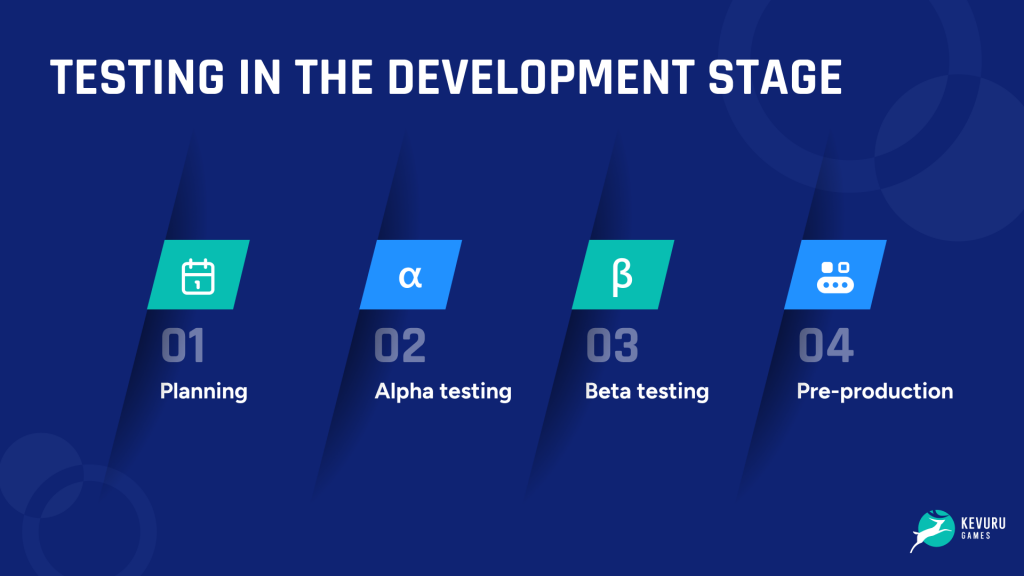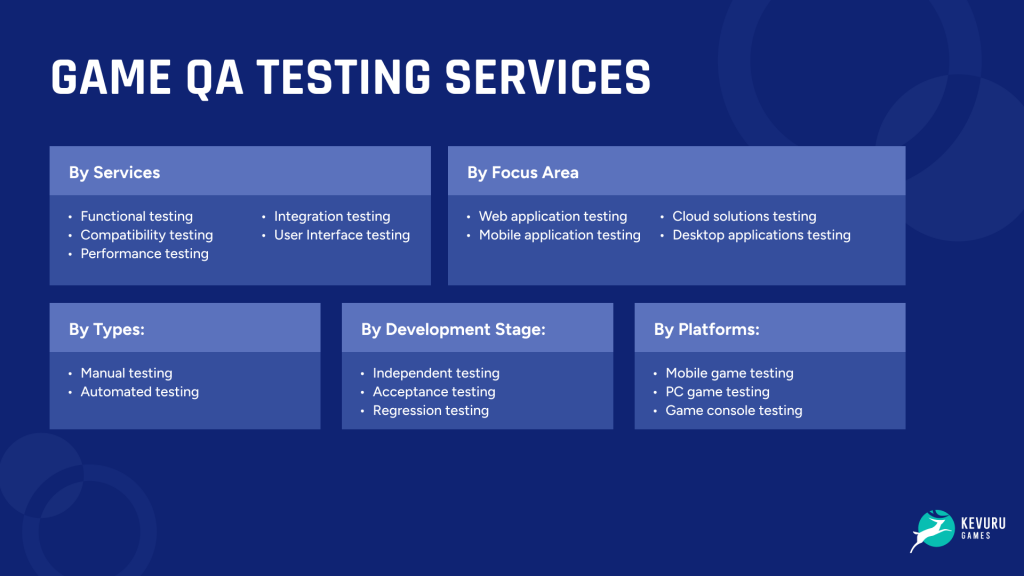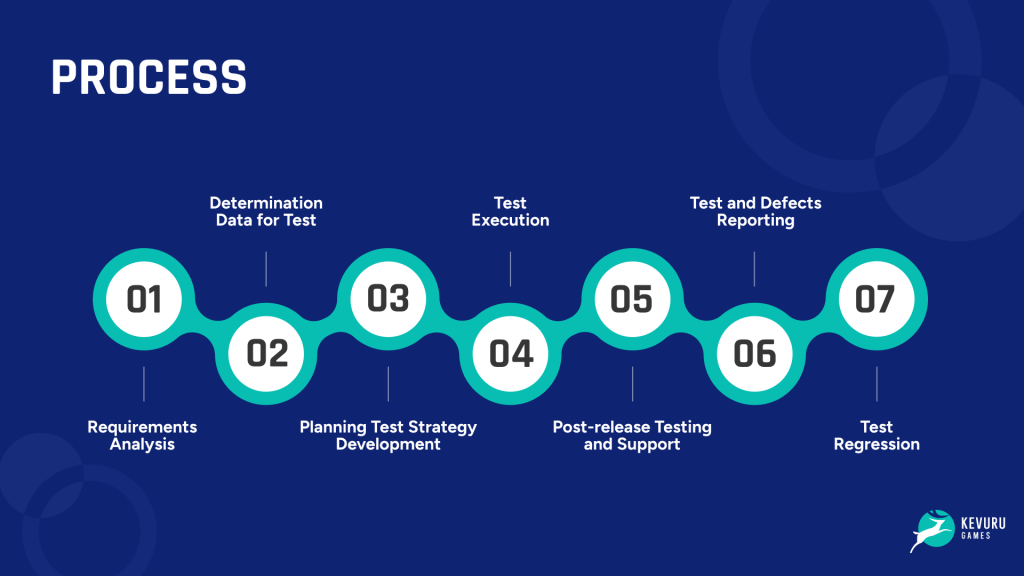Many captivating game experiences have hit the market recently. Yet, not all digital products manage to gain applause. While some games enchant players, others must fight to stand out from rivals in the competitive market. The success of a mobile game on the market depends upon many factors. Let’s explore the stages of game testing, which play a crucial role in the game’s success on the market. Just as testing mobile applications is paramount, so is the examination of mobile game testing.

Testing in the Development Stage
It’s a vital part of development. Planned and executed process involving various strategies and stages of video game testing. It ensures the successful delivery of a high-quality software product. From initial planning to final submission or pre-production, the team approaches each step with an analytical mindset. The process of how long does it takes to make a game adheres to industry best practices and standards.
1. Planning
The first stage of testing in the development revolves around careful planning. Test planning includes defining the scope, objectives, and strategies for testing and considering many factors. Such as project requirements, timelines, available resources, and target audiences. Developers work with stakeholders, including project managers, product owners, and quality assurance teams, to create a comprehensive roadmap that guides testing efforts throughout the development lifecycle.
2. Alpha testing
After the planning, the testing process moves into the alpha testing stage. Alpha testing is an important step in the development cycle where software is tested in a controlled environment. Internal testers, often including developers and quality assurance experts, test the software’s features, focusing on detecting bugs, identifying usability issues, and ensuring the software meets its intended design and functionality. The goal of alpha testing is to identify and fix problems early in the development process. As a result it helps improve the overall quality and stability of the software.
Once the alpha stage is complete and the software has reached a certain level of stability, it moves into the beta testing stage.
3. Beta testing
There’s beta testing where the software is available to a limited group of external users representing the target audience. These users, often called beta testers, explore the software. They provide valuable feedback, and report issues or areas for improvement. It’s essential in validating the software’s functionality in real-world scenarios. These efforts are about gathering insights about users. And optimizing the user experience based on actual usage patterns and feedback.
Open beta testing expands the pool of testers to a larger audience. This stage offers the opportunity to gather diverse perspectives, uncover exceptional cases, and refine the software based on user expectations and preferences. The open beta stage also serves as a powerful marketing tool, generating user excitement and anticipation while identifying and addressing any remaining issues before the final release.
4. Pre-production stage
Finally, the testing process culminates in the submission or pre-production stage of the game. The team provides comprehensive assessments, final bug fixes, and if the product is ready for the market. Developers conduct rigorous testing for stability, performance, compatibility, and compliance with industry standards and regulations. This stage serves as a critical test point to validate the readiness of the software and ensure it meets established quality benchmarks and user expectations before its release.

Kevuru Games Expertise in Stages of Game Testing
Our team encompasses various stages of game testing. Thanks to 11 years of experience on the market, we know that comprehensive testing services ensure video games’ quality, functionality, and immersive experience.
Kevuru Games QA team takes a systematic approach to every aspect of video game testing, delivering exceptional results and exceeding our client’s expectations. We offer our expertise at every stage of game testing:
- Planning;
- Alpha Testing;
- Beta testing;
- Pre-Production Testing;
- Post-release testing and support.
So, our team offers complete end-to-end QA testing services to developers and publishers, so you could offer to your end user a bug-free and responsive gaming activity:

Our Game QA Testing Process
At Kevuru Games, we pride ourselves on our extensive experience and successful collaboration with gaming giants, which allows us to create a perfect project pipeline and maintain high-quality standards. Our well-structured and transparent process ensures that our clients are involved and informed at every stage, giving them a clear insight into the progress and results of our work. Here is an overview of our defined process:
1. Requirements analysis: We begin with a thorough examination of the project requirements. Our dedicated team works closely with clients to understand their vision, goals, and needs. By understanding the project requirements, we lay a solid foundation for the development process and ensure our work perfectly aligns with the client’s expectations.
2. Determination of test data: In this phase, we carefully determine the data needed for testing. We analyze the project specifications, game mechanics, and desired outcomes to determine the necessary test data to evaluate the game’s functionality, performance, and user experience. This step is critical to creating comprehensive and effective test cases.
3. Planning the development of the test strategy: our experienced QA experts carefully plan the test strategy. It includes defining the testing scope, determining the testing types required (functionality, performance, compatibility, etc.), choosing the testing tools and frameworks, and creating a test plan. We aim to optimize resources and ensure maximum test coverage to deliver a high-quality product.
4. Test execution: Once the test strategy is determined, we begin test execution. Our experienced QA team rigorously tests the game against predefined test cases and scenarios. We use manual and automated testing procedures to evaluate the game’s functionality, performance, compatibility, and overall user experience. Thorough and systematic testing allows us to identify and fix any defects or issues immediately.
5. Comparison and analysis of actual and expected results: After running the tests, we compare the actual and expected results. This analysis helps us identify any discrepancies, inconsistencies, or performance gaps. This careful comparison ensures that the game meets the desired quality standards and satisfies the customer’s requirements.
6. Test and bug reports: We emphasize comprehensive and transparent reporting to inform our customers about the testing process and the status of any defects found. We provide test reports detailing the results, defects, and their severity. Our reports provide a clear insight into the quality of the game and enable the development team to address any issues identified promptly.
7. Test regression: We then conduct a rigorous test regression process where we retest the game after bug fixes to ensure that the bug fixes do not lead to new issues and that the overall stability and functionality of the game are maintained.

Summary
All in all, video game testing services in the development stage follows a structured and analytical approach. It includes various stages such as planning, alpha testing, beta testing (including open and closed beta testing). And the submission or pre-production stage of the game. Each stage contributes to the refinement and validation of the software, enabling developers to discover and fix bugs, optimize functionality, and improve usability.
By adhering to authoritative methodologies and leveraging user feedback, developers can deliver a high-quality software product. It will resonate with the target audience and meet demanding industry standards. There’s no need to explain how important it is to find the right team to test your gaming product to ensure its success on the market.
All in all, mobile game testing techniques in the development stage follows a structured and analytical approach. It includes various stages such as planning, alpha testing, beta testing (including open and closed beta testing). And the submission or pre-production stage of the game. Each stage contributes to the refinement and validation of the software, enabling developers to discover and fix bugs, optimize functionality, and improve usability. By adhering to authoritative methodologies and leveraging user feedback, developers can deliver a high-quality software product. It will resonate with the target audience and meet demanding industry standards. There’s no need to explain how important it is to find the right team to test your gaming product to ensure its success on the market.










